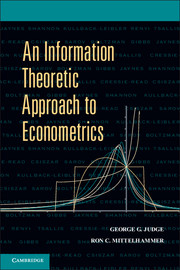Book contents
- Frontmatter
- Contents
- Preface
- One Econometric Information Recovery
- Part I Traditional Parametric and Semiparametric Econometric Models: Estimation and Inference
- Part II Formulation and Solution of Stochastic Inverse Problems
- Four A Stochastic-Empirical Likelihood Inverse Problem
- Five A Stochastic Empirical Likelihood Inverse Problem
- Six Kullback-Leibler Information and the Maximum Empirical Exponential Likelihood
- Part III A Family of Minimum Discrepancy Estimators
- Part IV Binary–Discrete Choice Minimum Power Divergence (MPD) Measures
- Part V Optimal Convex Divergence
- Abbreviations
- Index
- References
Six - Kullback-Leibler Information and the Maximum Empirical Exponential Likelihood
from Part II - Formulation and Solution of Stochastic Inverse Problems
Published online by Cambridge University Press: 05 June 2012
- Frontmatter
- Contents
- Preface
- One Econometric Information Recovery
- Part I Traditional Parametric and Semiparametric Econometric Models: Estimation and Inference
- Part II Formulation and Solution of Stochastic Inverse Problems
- Four A Stochastic-Empirical Likelihood Inverse Problem
- Five A Stochastic Empirical Likelihood Inverse Problem
- Six Kullback-Leibler Information and the Maximum Empirical Exponential Likelihood
- Part III A Family of Minimum Discrepancy Estimators
- Part IV Binary–Discrete Choice Minimum Power Divergence (MPD) Measures
- Part V Optimal Convex Divergence
- Abbreviations
- Index
- References
Summary
Introduction
In this chapter, we continue to build on the extremum (E) estimation and estimating equations (EE) concepts introduced in Chapter 3 and the maximum empirical likelihood (MEL) approach demonstrated in Chapters 4 and 5. Our focus is on methods of estimation and inference involving stochastic inverse problems of the form (Y, X)⇒(η, σ2, ε). In this context, in this chapter we introduce the Kullback-Leibler Information Criterion (KLIC) and the maximum empirical exponential likelihood (MEEL) function and estimator.
Solutions to Systems of Estimating Equations and Kullback-Leibler Information
The procedures examined in the previous three chapters involved solutions relating to systems of estimating equations (EEs). In both the MEL and EE contexts, the EEs were empirical analogs to expectation relations of the type E[h(Y, X, θ)] = 0. Estimators for θ, defined by the solution to moment equations, subsume a large collection of familiar estimation procedures that include linear and nonlinear least squares. The idea of basing an estimator definition on the solution to EEs can be applied quite generally to extremum problems, as demonstrated in Chapter 3.
Information
- Type
- Chapter
- Information
- An Information Theoretic Approach to Econometrics , pp. 104 - 132Publisher: Cambridge University PressPrint publication year: 2011
